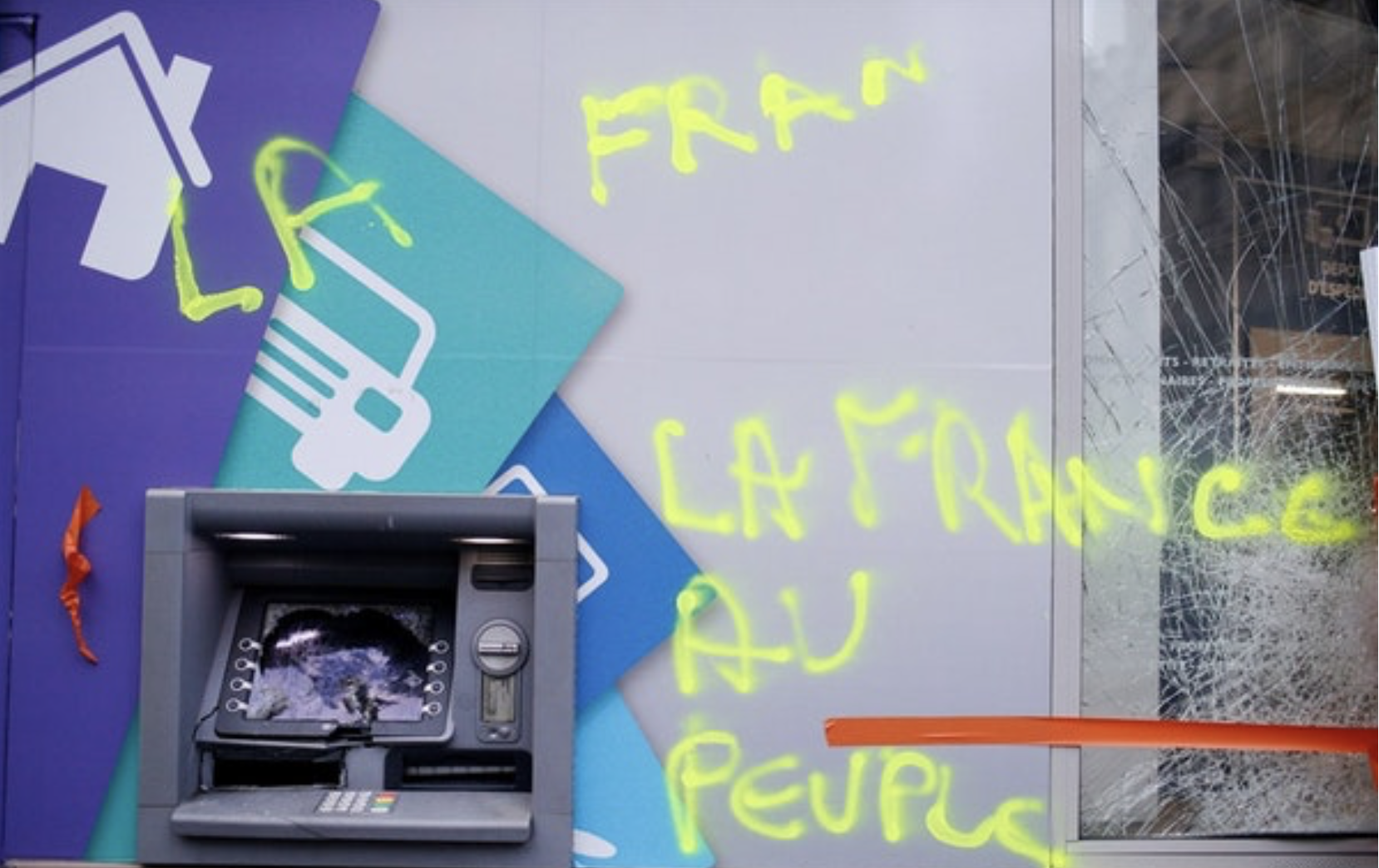
New movement against big corporations and unresponsive government is active in Belgium, Spain, Italy, Bulgaria, Germany and the Netherlands
By Margot Grant
Despite French prime minister Edouard Philippe’s announcement that fuel tax rises that have led to weeks of violent clashes in France are postponed until the Summer, it does not look like the protests are abating. French unions are calling for demonstrations and blockades across France coming weekend. The movement is spreading across Europe.
French police say more than a million of the 67-million population are actively involved in the protests taking place across the country. A poll commissioned by the French newspaper Le Figaro showed that 77 per cent of the population support the gilets jaunes (yellow vests).
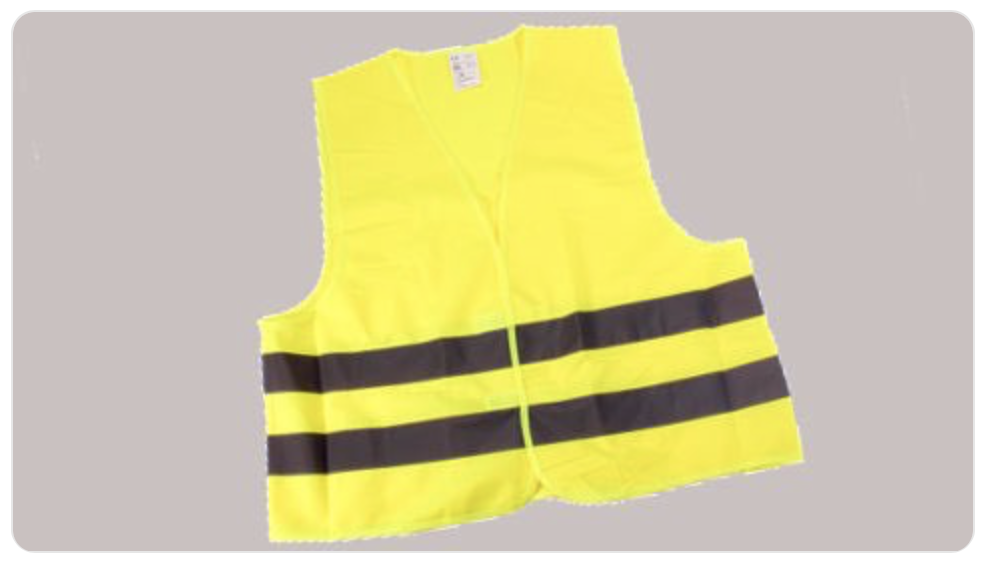 The movement is named for the fluorescent-yellow safety vests European motorists are required to carry in their vehicles in case of a roadside crash. They are an emblem of a grass-roots movement made up mostly of working people.
The movement is named for the fluorescent-yellow safety vests European motorists are required to carry in their vehicles in case of a roadside crash. They are an emblem of a grass-roots movement made up mostly of working people.
We’ve had enough, protesters say: we work fulltime and we can’t afford housing, we can’t afford gas to go to work. Two to three weeks into the month, we run out of money, while the rich live in excessive luxury.
“The measures announced today do not satisfy us at all, for the simple reason they don’t go far enough,” a spokesperson for yellow vests said in Toulouse.
“The French people want a complete political transformation. They want to change the way things have been for the last 30 years,” he said. “We’re sick and tired of taxes being raised and the quality of public services going down. There are more and more people out there who can’t make ends meet each month, more and more people are sleeping rough and yet we continue to raise taxes. Where is the money going? Where is it being used?”
A 30-year factory worker in the south of France talked of “a broken society where we’re counting pennies to reach the end of the month, sick of politicians who don’t give a damn robbing the poor to give to the rich”.
Dominique, 50, an unemployed technician at a roadblock in the town of Martigues, near Marseille, said: “It’s about much more than fuel. The government has left us with nothing.”
“People from every social background are here because we are all affected,” said Cyrille Charton, an agrifood sales rep. “They expect us to pay 30 per cent more for fuel, but if I tell my clients they will have to pay 30 per cent more for products, they’d think I was joking. We’ve had enough.”
Priscilla Ludosky, a business manager whose petition against the price rises attracted 879,000 signatures and is believed to have inspired the gilets jaunes movement, said she was surprised at how it had captured popular opinion. “Nobody thinks about people on the city fringes, in the provinces, the rural areas. They tell them to use alternative forms of transport, but in reality that’s not possible. They have no other choice but to pay up.”
The spontaneous popular revolt, which started three weeks ago, has no leaders, no members, and a diffuse set of demands. Popular ones are ‘a government for the people, not against the people,’ ‘an end to exploitation by big corporations and government,’ and ‘a future for our children.’
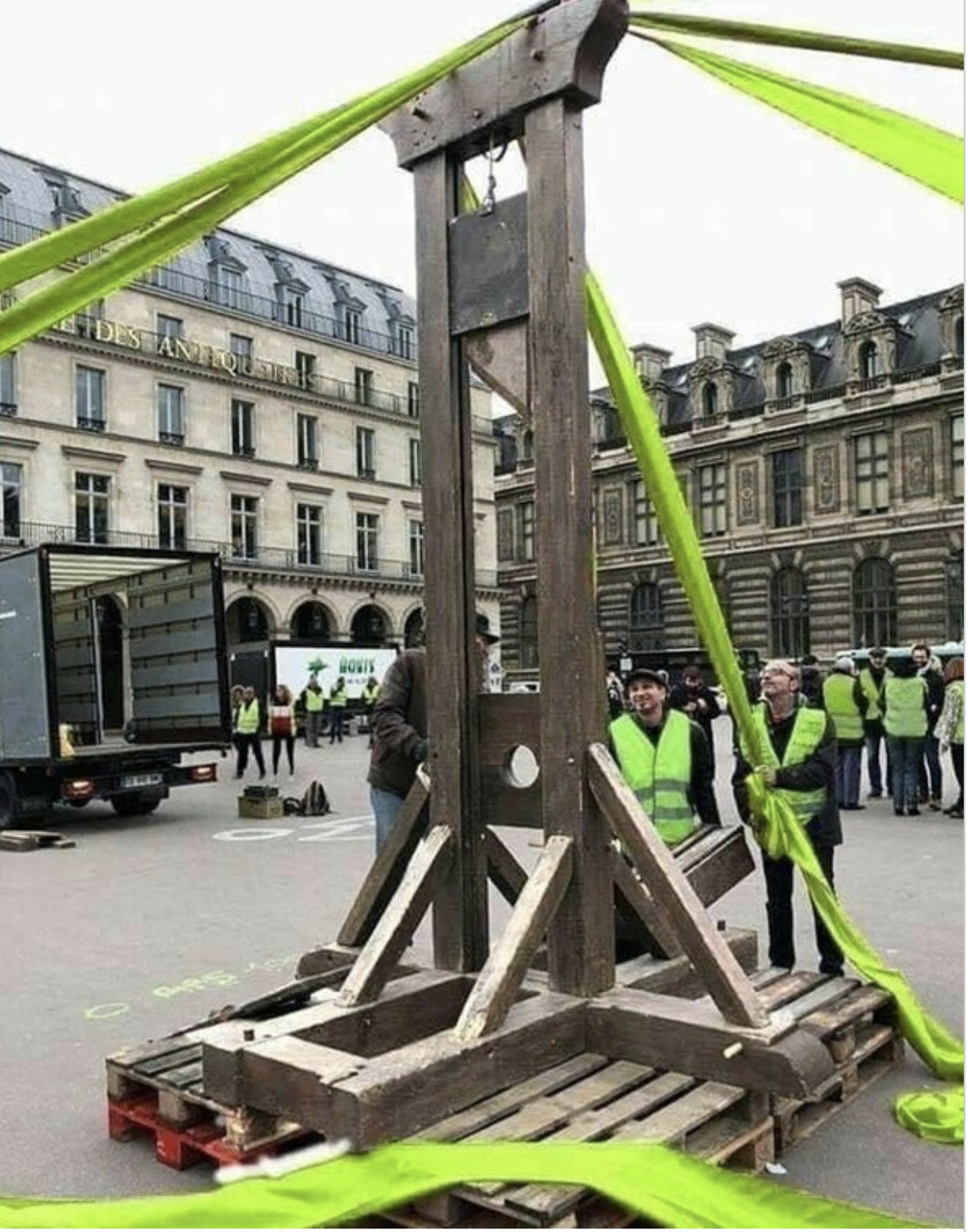
Le Monde, France’s leading newspaper, reported slogans like: “We cut off heads for less than this.” A group of protesters has symbolically erected a guillotine in Paris “to cut off the heads of big corporations.”
Another popular slogan is ‘don’t forget 68.’ After violent riots in Paris in the Summer of 1968 the minimum wage went up 35 per cent, all wages increased 10 per cent, and workers received an extra week of paid holidays.
Last week in Paris, yellow vests arrived with a cement-mixer and a load of bricks at the wrought-iron gate of Macron’s palace and bricked it shut.
The Interior Ministry said protests this weekend drew 136,000 people nationwide — less than last week, but the police say the actual figure is more than a million. Politicians and law enforcement officials have started to use the word “insurrection.”
This weekend, the protests were going on in more than 2,000 locations, including all major French cities. In several places, the police have sided with the protesters. This has happened at some barricades in Paris as well. Ambulance workers and fire fighters have also staged demonstrations.
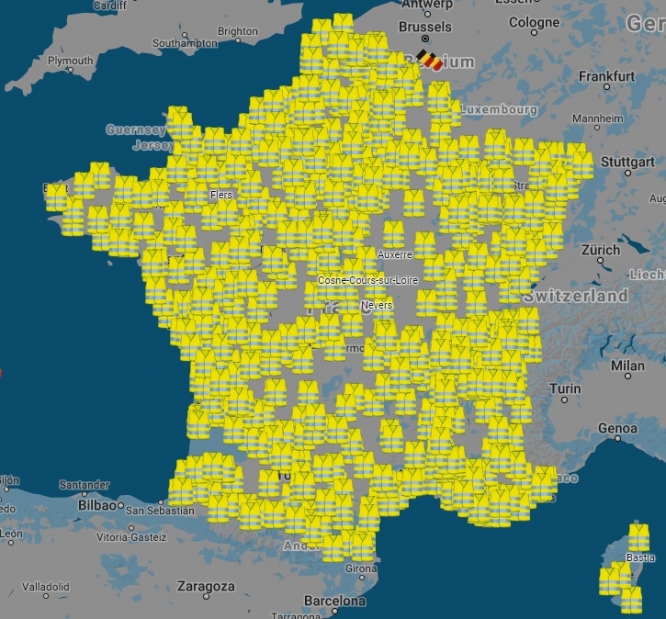
The protests take place mostly on weekends because people work during the week. Over the past three weekends yellow vests have put up blockades on major highways across France and closed down tollbooths to let traffic pass for free. They have also erected barricades at roundabouts, fuel depots and airports. This weekend, a highway tollbooth was set on fire near Narbonne. Yellow vests reportedly closed the parking booths at EuroDisney near Paris in a bid to make the attraction more affordable.
Near Toulouse, yellow vests occupied a regional distribution centre of supermarket chain Leclerc to supply the food bank with large quantities of groceries until a judge ordered an end to the action three days later.
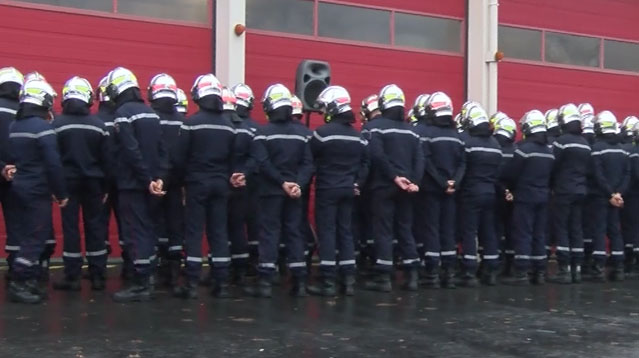
In Cholet, between Nantes and Poitiers, the fire brigade turned its back to the mayor and regional fire chief during a ceremony and marched off. “They don’t listen to us,” the firemen told reporters.
The mayor of Chartres-de-Bretagne has offered the yellow vests a temporary office in a room in the town hall.
Across France, yellow-vest protests have been peaceful, with people bringing food, singing the French national anthem and creating a pleasant atmosphere. The violent riots in Paris are an exception, and the rioters have been called both extreme right-wing and extreme left-wing activists. 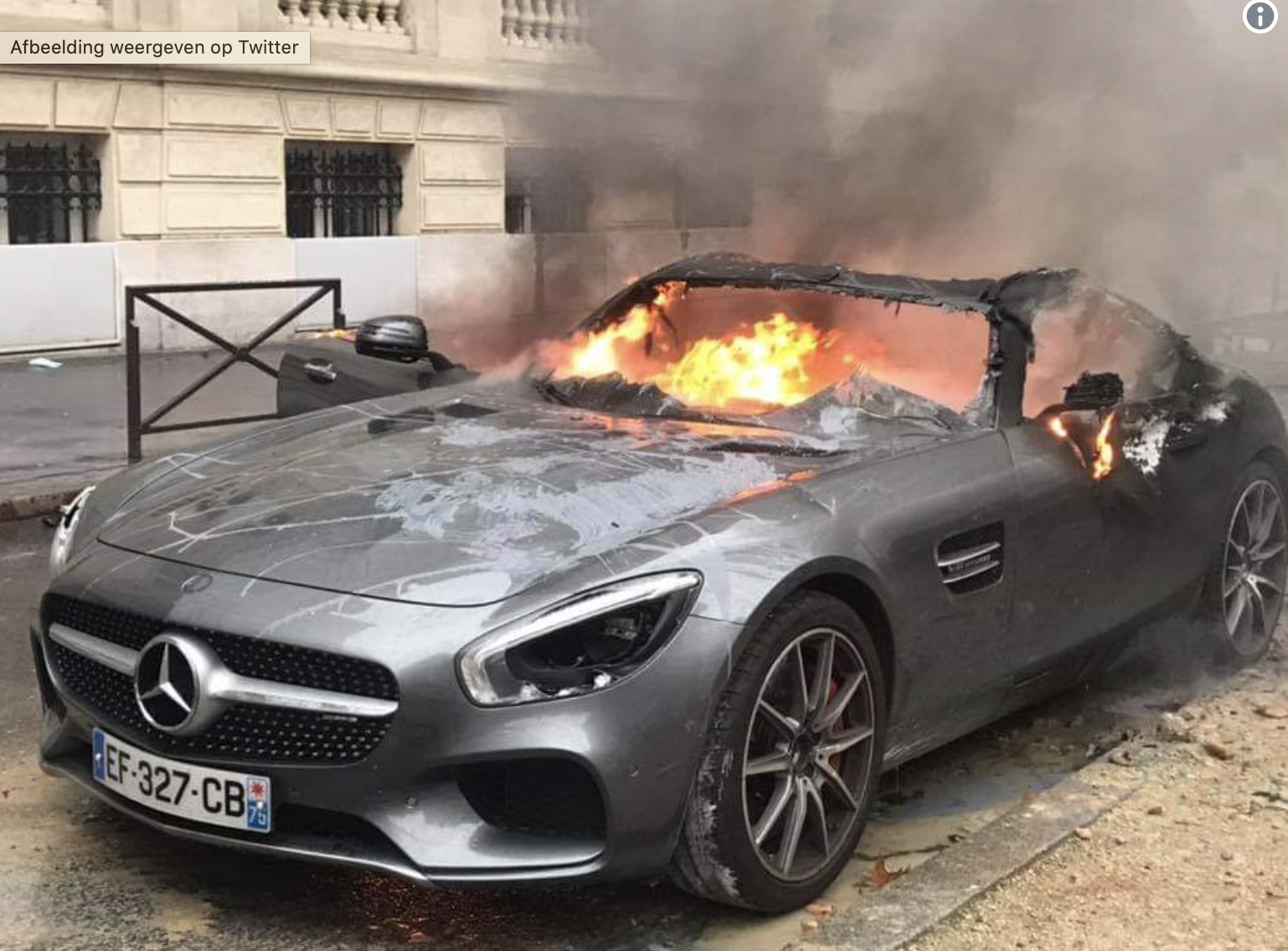 Riot police have been overwhelmed as protesters run amok in Paris’s wealthiest neighbourhoods, torching dozens of cars, looting boutiques and smashing up luxury private homes and cafes.
Riot police have been overwhelmed as protesters run amok in Paris’s wealthiest neighbourhoods, torching dozens of cars, looting boutiques and smashing up luxury private homes and cafes.
President Macron may have doubts about the loyalty of the police; he has asked his interior minister to prepare security forces for future protests.
WikiLeaks has published two videos of sharpshooters on a Paris roof aiming at people with yellow vests. The first one shows the snipers and the second shows someone getting shot.
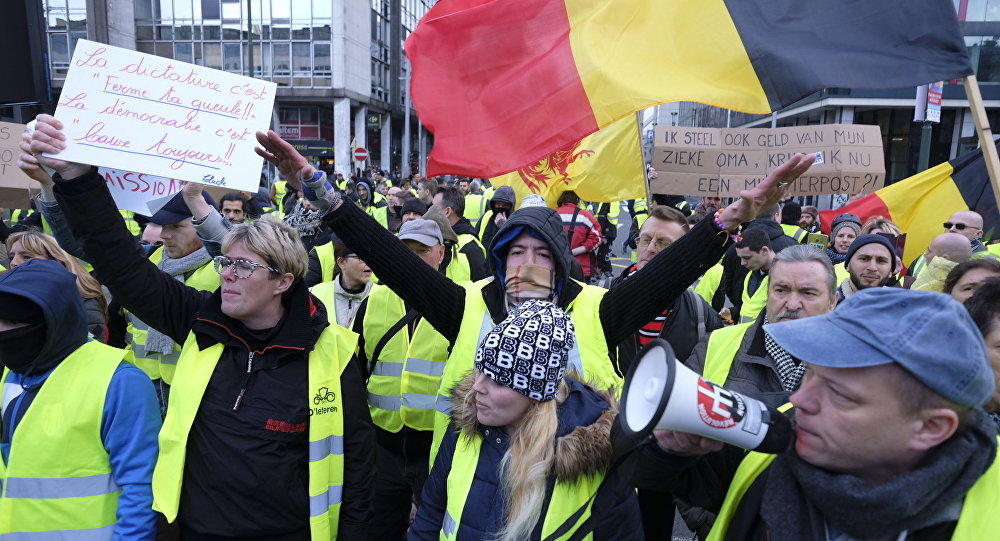
The yellow-vest movement has spread to Belgium as well. This weekend, police in Brussels used water canons and tear gas to disperse yellow-vest protesters. The demonstrations and blockades of highways, fuel depots and airports across the French part of Belgium have been less peaceful than those in France (except for Paris). This weekend, yellow-vest demonstrations started in the Flemish part of Belgium as well; 39 people were arrested.
In Spain, there are blockades and strikes in Madrid, Andalucia and other areas in the past few days. In Bulgaria, almost all major roads were blocked during the past two weekends in protests against high fuel prices and inequality. In Germany, Italy, Austria, and the Netherlands, almost every city now has a — sometimes small —yellow-vest group organizing demonstrations.
“I’m concerned about the closure of hospitals, deteriorating seniors’ care and people who don’t have money for food. But most of all, I’m angry that we are being lied to and that nobody listens to us. We have a right to be heard,” said demonstrator Jenny Brouwer in the Dutch city of Nijmegen.
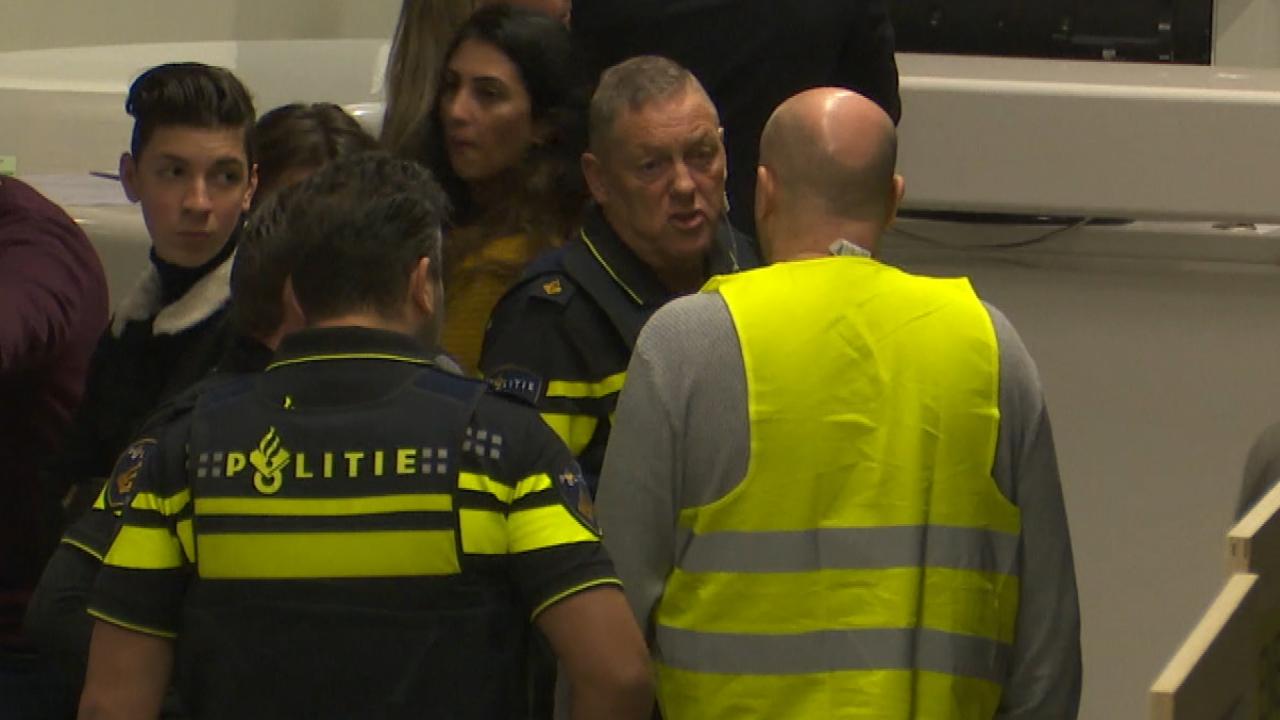
The Dutch authorities seem to have a fear of yellow vests. At a demonstration this weekend in The Hague, the capital, police told demonstrators they were not allowed to wear yellow vests and ordered them to take them off, which they did. On Monday, a man peacefully attending a debate in the House of Parliament in a yellow vest was escorted out of the building by police. The video went viral.
Yellow vests are suddenly hard to find in stores in the Netherlands. In France, Belgium, Spain, Germany and the Netherlands, men wear yellow ties to the office and people display yellow vests and yellow ribbons on balconies and cars.
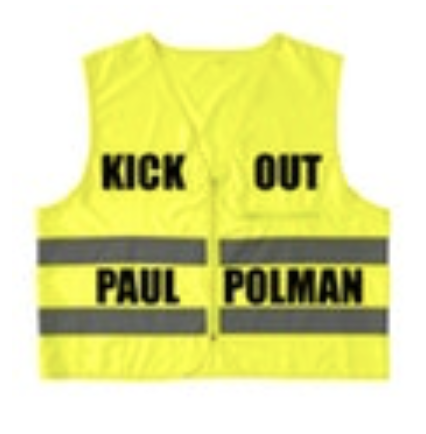 After a highly-publicized yellow vest campaign in the Netherlands against Paul Polman, CEO of multinational corporation Unilever, who advocated the abolition of a dividend tax, Polman stepped down, saying he was retiring anyway.
After a highly-publicized yellow vest campaign in the Netherlands against Paul Polman, CEO of multinational corporation Unilever, who advocated the abolition of a dividend tax, Polman stepped down, saying he was retiring anyway.
There have been reports that Facebook shuts down calls for yellow-vest action, but it is still possible to join Facebook yellow vest groups. Despite rumours that Twitter immediately closes accounts of people trying to organize demonstrations, not all accounts have been closed.
Here are some links for further information about the yellow vest movement:
YouTube has a channel about yellow vests: https://www.youtube.com/channel/UCKhWMZRG_CN-S8_9UmC6PoA?fbclid=IwAR1QMLJT4-xtYjqCFfMiOvOLp26vxxobbTrhqxxbEKluyVE-RbfMjkTqK6Y
This is the Facebook page Yellow vests Europe: https://www.facebook.com/groups/2245622328982738/?ref=bookmarks
https://www.bbc.com/news/world-europe-46437904
https://www.bbc.com/news/world-europe-46424267
https://www.cbc.ca/news/world/france-yellow-vests-murray-analysis-1.4931597
https://www.theguardian.com/world/2018/nov/24/paris-fuel-tax-protest-macron-france-poverty
https://www.cbc.ca/news/world/paris-france-fuel-tax-protest-riot-1.4928824
Informative article. Thank you. I usually appreciate your local news focus however the story of “gilets jaunes” that broke over the weekend had me doing my own research. Who are they and why are the violently protesting? I had not bothered as the Coast Clarion had me covered!
Brilliant work!
Thanks for this information, Margot. I wasn’t hearing about this on C.B.C.
Thanks, Margot. Not at all surprised. With freedom of speech diminished in so many countries now, and nobody governing giving a damn for any but themselves; it’s a courageous move by those
in most populations in Europe (and world wide) who understand what is happening everywhere.
Rings a bell, anyone?
For a broad overview connected with these events, see
https://www.democracynow.org/shows/2018/12/7
Progressive International: Yanis Varoufakis & Bernie Sanders Launch New Global Mvt Against Far Right